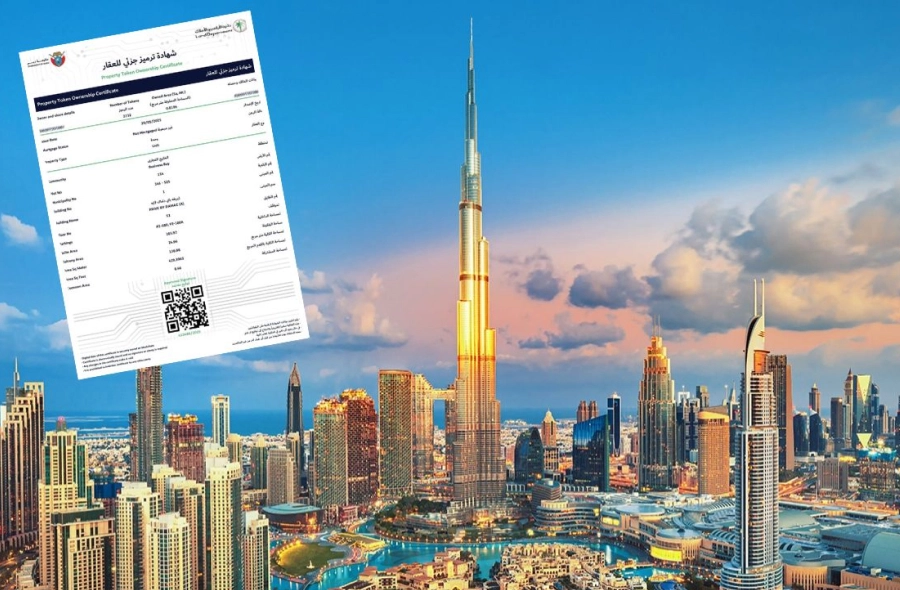Dubai Launches First Licensed Tokenized Real Estate Project in MENA Region
Dubai has launched the MENA region’s first licensed tokenized real estate project, allowing investors to buy property shares starting from $545. The initiative uses blockchain technology to democratize real estate investment and enhance market liquidity.

Dubai has officially launched the Middle East and North Africa (MENA) region’s first licensed tokenized real estate project, marking a groundbreaking milestone in the intersection of blockchain technology and property investment. This pioneering initiative represents a seismic shift in how real estate transactions and ownership can be structured, potentially revolutionizing access to property markets across the region.
The project emerges as a collaborative effort between several key institutions, including the Dubai Land Department (DLD), the Central Bank of the United Arab Emirates, and the Dubai Future Foundation. This high-level institutional backing demonstrates Dubai’s commitment to positioning itself as a global leader in digital asset innovation and blockchain adoption.
Platform and Trading Infrastructure
The tokenized real estate shares will be traded exclusively on the newly launched “Prypco Mint” platform, accessible at mint.prypco.com. Zand Digital Bank has been appointed as the banking partner for the project’s pilot phase, ensuring robust financial infrastructure and regulatory compliance. This strategic partnership provides the necessary traditional banking support while embracing cutting-edge blockchain technology.
The platform enables users to access comprehensive property details, including pricing structures, risk factors, technical specifications, and minimum investment requirements, ensuring complete transparency and informed decision-making processes. This level of detail represents a significant advancement in making real estate investment more accessible and transparent to retail investors.
Investment Structure and Accessibility
One of the most revolutionary aspects of this project lies in its democratization of real estate investment. Individual investors can now purchase tokenized shares in “ready-to-own properties in Dubai” with a remarkably low minimum investment threshold of just 2,000 Emirati dirham (approximately $545). This represents a dramatic reduction in the traditional barriers to entry for Dubai’s premium real estate market.
During the pilot phase, all transactions will be conducted exclusively in UAE dirham (AED), with no cryptocurrency payments accepted. While the initial rollout is limited to UAE ID holders, the government has confirmed ambitious plans for global expansion in the near future. This phased approach allows for careful monitoring and refinement of the system before broader international implementation.
Regulatory Framework and Legal Foundation
The project operates under a robust regulatory framework established by Dubai’s Virtual Assets Regulatory Authority (VARA), which updated its rules on May 19, 2025, to specifically include real-world asset (RWA) tokenization. This regulatory update allows such tokens to be traded on secondary markets, providing liquidity and exit opportunities for investors that were previously unavailable in traditional real estate investments.
The legal foundation was further strengthened in April when the DLD and VARA agreed to link Dubai’s real estate registry with property tokenization infrastructure. This integration creates a seamless connection between traditional property records and blockchain-based ownership tokens, ensuring legal clarity and enforceability.
Market Impact and Global Significance
This initiative positions Dubai as the first city in the MENA region to adopt a licensed platform for real estate tokenization. The project is powered by the XRP Ledger, a decentralized public blockchain that ranks fourth globally by market capitalization. This choice of blockchain infrastructure reflects Dubai’s commitment to using established, reliable technology for this groundbreaking initiative.
The global real estate tokenization market is projected to reach $19.4 billion by 2033, with an annual growth rate of 21%. Dubai’s early adoption and regulatory clarity could position it as a leader in capturing this emerging market opportunity. The project serves as part of the UAE’s ambitious $16 billion initiative to double its digital economy by 2032.
Strategic Objectives and Future Vision
The stated goals of this tokenization project include attracting global investors and enhancing liquidity in Dubai’s real estate market. Traditional real estate investments have long been criticized for their illiquidity and high barriers to entry. By fractionalizing property ownership through blockchain technology, Dubai aims to create a more dynamic and accessible real estate investment ecosystem.
This move reinforces Dubai’s broader strategy to become a comprehensive crypto hub, building on recent initiatives such as partnering with Crypto.com to facilitate cryptocurrency payments for government services. The integration of blockchain technology into core economic sectors like real estate demonstrates Dubai’s commitment to technological innovation and financial modernization.
The project represents more than just a technological advancement; it signals a fundamental shift in how property ownership and investment can be conceptualized in the digital age. By combining regulatory clarity, institutional backing, and innovative technology, Dubai has created a template that other jurisdictions may seek to emulate as the tokenization of real-world assets continues to gain momentum globally.
FAQ
1. What is the minimum investment amount for Dubai’s tokenized real estate project?The minimum investment is 2,000 UAE dirham (approximately $545), making real estate investment accessible to a much broader range of investors.
2. Can international investors participate in the project?Currently, only UAE ID holders can participate in the pilot phase, but there are confirmed plans to expand access globally in the future.
3. Are cryptocurrency payments accepted for these investments?No, during the pilot phase, all transactions must be conducted in UAE dirham (AED) with no cryptocurrency payments allowed.
4. Which blockchain technology powers the platform?The project is powered by the XRP Ledger, a decentralized public blockchain that ranks fourth globally by market capitalization.
5. What regulatory authority oversees this project?Dubai’s Virtual Assets Regulatory Authority (VARA) provides regulatory oversight, having updated its rules in May 2025 to specifically accommodate real-world asset tokenization.
Notes:
These articles are crafted to enhance your knowledge and education in the space, and are not intended to serve as investment guidance. Remember to do your own research (DYOR) 🤘

